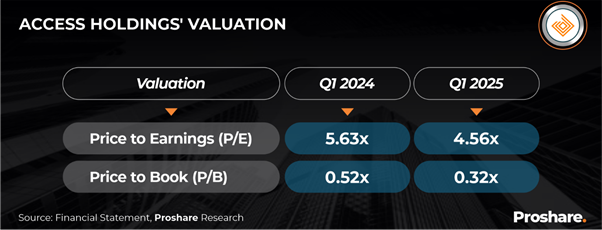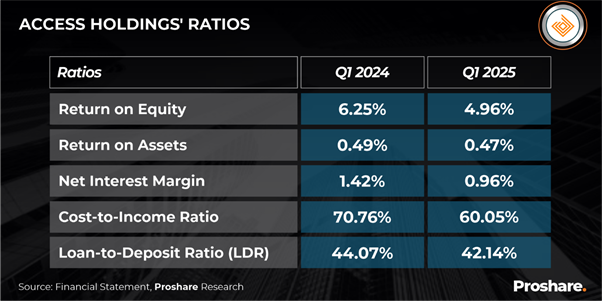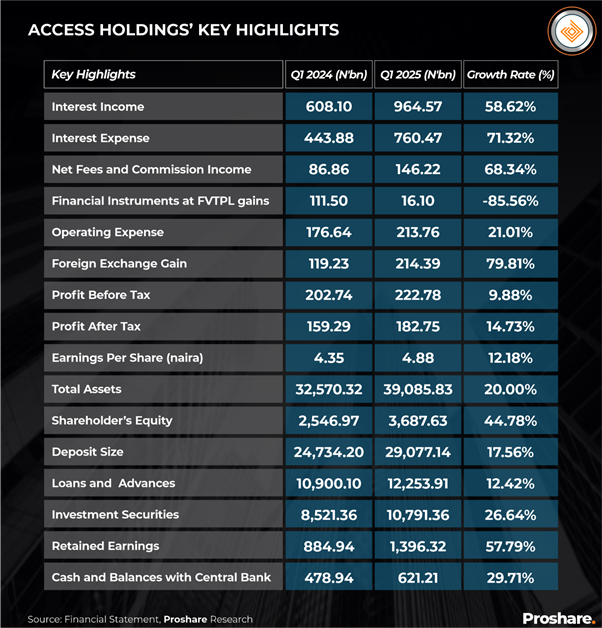Access Bank : A Discounted Stock with Hidden Concerns.

In the Nigerian banking sector, where financial metrics are scrutinized and investor confidence is paramount, Access Bank’s valuation metrics present a paradox. On the surface, the bank’s stock appears undervalued, with a price-to-earnings ratio of 4.56x and a price-to-book ratio of 0.32x. However, a closer examination reveals underlying concerns that may be driving these discounted valuations. As the banking landscape continues to evolve, can Access Bank address its fundamental challenges and unlock value for its shareholders, or will its valuation remain a puzzle with no solution?

Access Bank’s valuation metrics reveal a complex picture of its financial performance. The bank’s price-to-earnings (P/E) ratio decreased from 5.63x in Q1 2024 to 4.56x in Q1 2025, indicating that investors are pricing in underlying weaknesses. Similarly, the price-to-book (P/B) ratio dropped from 0.52x in 2024 to 0.32x in 2025, suggesting that the bank’s stock may be undervalued compared to its book value.

When compared to its peers, Access Bank’s financial performance may be lagging, leading to a discount in its valuation multiples. Several factors may contribute to Access Bank’s low valuation, including high debt levels funding rapid expansion, weak fundamentals, and inefficient performance.

The bank’s inability to translate its asset dominance into proportional value and its struggles with interest expenses and net interest income raise concerns about its financial performance. As the banking sector continues to evolve, Access Bank must prioritize effective risk management, interest rate strategies, and resource leverage to remain competitive.
Shareholders of Access Bank are growing increasingly concerned about the bank’s declining return on equity (ROE), assets (ROA), and net interest margin (NIM). Despite the bank’s impressive growth in gross earnings, its profitability metrics have failed to keep pace, raising questions about the effectiveness of its business model and management’s ability to generate returns for investors. The bank’s ROE, ROA, and NIM have all trended downwards, indicating that Access Bank is generating lower returns on its equity and assets, and facing pressure on its core lending business.
Access Bank’s Asset Dominance Fails to Translate to Market Value
Despite being Nigeria’s largest bank by assets, Access Bank’s market capitalization tells a different story. With a market cap of approximately ₦1.3 trillion, Access Bank lags behind its peers, Zenith Bank and GTCO, which have market caps of ₦2.361 trillion and ₦2.091 trillion, respectively. This disparity raises questions about Access Bank’s ability to translate its asset dominance into proportional value and outperform its competitors.The fact that United Bank for Africa (UBA) has a market cap of ₦1.79 trillion, higher than Access Bank’s, further underscores the bank’s challenges.
Possible Reasons for the Low Valuation
There are several possible reasons for Access Holdings’ low valuation. One reason is the company’s high debt levels, which have funded its rapid expansion. While this growth strategy may have benefits, it also comes at a cost to shareholders, who may not be seeing sufficient returns on their investment.
Another factor contributing to the low valuation may be the company’s relatively low dividend payouts. Access Holdings has a history of paying out smaller dividends compared to its peers, which could be deterring investors.
Access Bank’s valuation metrics suggest that its stock may be undervalued, but a closer look at its fundamentals reveals a more nuanced picture. The bank’s low price-to-earnings (P/E) ratio of 4.56x and price-to-book (P/B) ratio of 0.32x indicate that investors are pricing in underlying weaknesses. Compared to its peers, Access Bank’s financial performance may be lagging, leading to a discount in its valuation multiples. Potential areas of concern include slower growth in earnings or revenue, lower profitability margins, higher risk profile or asset quality issues, or inefficient capital allocation or utilization. When compared to peers like Zenith Bank and Guaranty Trust Bank (GTCO), Access Bank’s fundamentals may appear weaker, justifying the lower valuation multiples. If these peers have stronger financial metrics, such as higher returns on equity (ROE) or return on assets (ROA), it would support the notion that Access Bank’s stock is undervalued due to its relatively weak fundamentals. This disparity in financial performance and valuation multiples suggests




